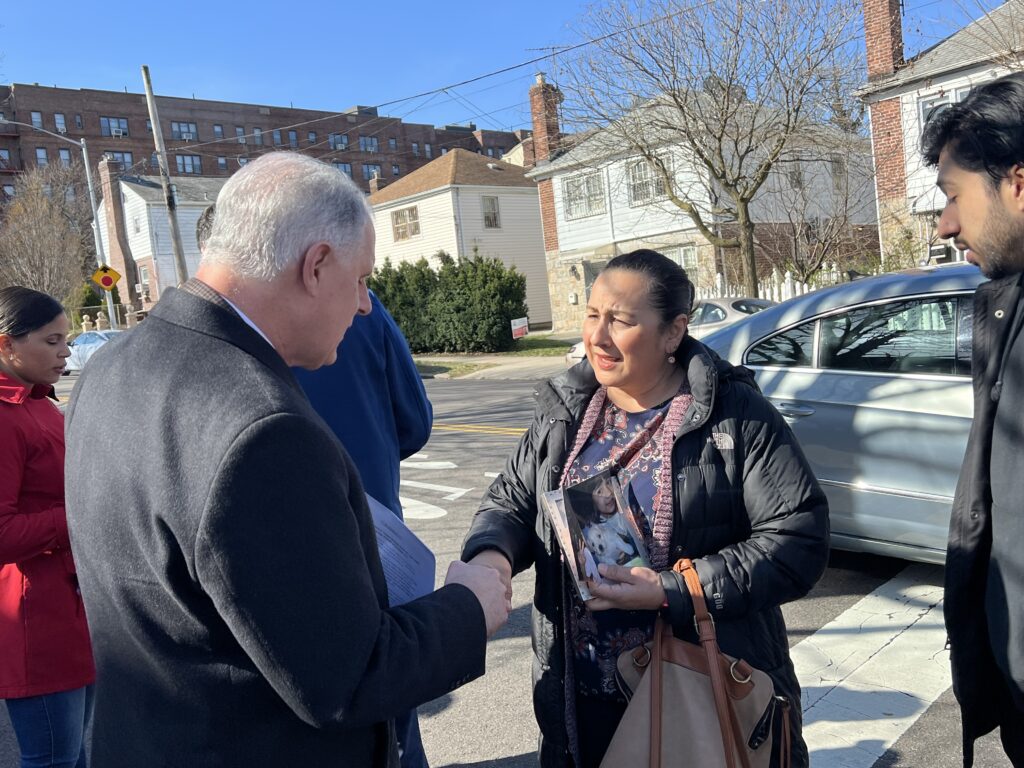By Alicia Venter
aventer@queensledger.com
On March 12, the Leon family of Briarwood frantically searched for their missing dog Leona.
As a 19-year-old animal, they knew her eyesight wasn’t great and she was frail, so they spent the morning walking the blocks around their home calling her name and scouring the internet for any signs of her.
Through Facebook, they found good news — a picture of Leona on a missing pets group page. Upon calling the Good Samaritan who made the post, they found out she had been taken to an Animal Care Centers of New York City (ACC) shelter at 2336 Linden Blvd in Brooklyn.
This, the Leon family described on Monday at a press conference in Briarwood, is where the good news ended. Upon calling the shelter, the family discovered their dog had been euthanized by the shelter managed by ACC, which is overseen by the New York City Department of Health & Mental Hygiene (DOHMH).
Standing at the intersection where Leona was first discovered by that good samaritan, on the Southeast corner of Smedly Street and Coolidge Avenue, the Leon family and local council member James F. Gennaro (D-Kew Gardens) claimed that the ACC went outside of its own policy and euthanized Leona inhumanely. They are calling upon the DOHMH to launch a formal investigation into the practices of the ACC.
“This is a grieving family that suffered the loss of their beloved pet, Leona, at the hands of the ACC for reasoning that I truly believe was completely unwarranted and atrocious,” Gennaro said. “Nothing like this should befall this family.”
“They didn’t get us the opportunity to say goodbye,” Vianey Areica Leon, the family’s mother said.

Vianey Areica Leon, the family’s mother, meeting Councilmember Gennaro for the first time.
According to policy found on their website, ACC shelters give potential owners 72 hours to reclaim their pet.
“We also will check for a microchip and search through various databases for any reports of lost pets that may fit the description of that animal. If no one claims during the holding period, he/she will receive a Placement Evaluation to determine next steps,” the website states.
Juan Leon described how the official time of death has not been provided for their dog, but that he expects it was just hours after she arrived at the shelter.
“Part of us is truly gone. She was the first love of my life,” Juan said, adding that he doesn’t understand how the ACC is able to operate in this way.
“We keep getting told different answers and we’re starting to notice that with every comment the ACC makes, they change the rules. They have a loophole for every action that they do,” he said.
However, the ACC shared in a statement to the Queens Ledger that the pets’ deteriorating health conditions led them to step outside this policy.
“She had no identification, no dog license and was not microchipped. Upon intake, Leona was seen spinning in circles and was wobbly when walking. A comprehensive physical exam was done by a veterinarian indicating that she was in a very debilitated state and suffering from progressive neurologic symptoms. She was minimally aware of her surroundings, non-reactive to stimuli, weak and unable to stand for more than a few minutes before falling. She was emaciated with a body condition of 2/9 indicating possible chronic illness. The doctors at ACC do not take euthanasia lightly. It is their job to direct a course that is in the best interest of the animal. In Leona’s case, given her present state and in addition to all the other chronic, debilitating conditions she had (heart disease, blind, deaf, and severe dental issues) the doctors believed her to be suffering,” the statement read.
The emailed statement then stated that the law was on their side.
“For dogs with serious medical conditions and especially those stemming from extreme old age who are in pain and suffering, it is the duty of veterinary staff to provide peaceful end of life care. This decision is not made lightly but is always made in the best interest of the pet. In these cases, if a pet has been lost or abandoned, we scan for identification that ideally will lead us back to an owner before any end-of-life decision is made. However, if there is no information at all from a microchip or any other identification, we must make the decision on our own within the most humane timeframe. Euthanasia of stray animals is regulated by New York State Agriculture and Markets Law: https://www.nysenate.gov/legislation/laws/AGM/A26. The law specifically states that if an animal is suffering, euthansia may be performed before the stray hold period is over.”
Juan shared that their veterinarian had described how there was little that could be done regarding the age-related issues that Leona had, but the family made the decision with the veterinarian that she would live the rest of her life at home.
“Leona never stood a chance the moment she walked to ACC and that’s not fair,” he said. “That’s not fair. She should have came home to us, and she should have died on our terms. Our family should have made that decision of when to start her end-of-life story.”
Juan’s sister Ericka expressed heartbreak over what happened to her dog, adding that she “thought shelters were a safe haven.”
“They took my dog from me,” she shared, holding back tears, adding that while she plans to fight with her family for justice for Leona, “at the end of the day, I’ve already lost.”
The Leon family suggested that their dog was cremated without their permission, and when they went to retrieve their pet, they were met with a hostile environment, claiming they were reminded more than once that there were officers near the property.
They also insinuated that they plan to take legal action.
The Leon family is planning a rally on April 15 at the ACC Administrative Offices at 11 Park Place in Manhattan.
Gennaro is calling upon the New York City Council’s Legislative Integrity Unit to ensure that the city is on-track in construction of a full-service shelter in Queens and the Bronx, as mandated by Local Law 123 of 2018. The law requires that the shelters be completed by July 1, 2024, and the Queens shelter is under construction in Ridgewood. The mayor’s office did not reply by publication with details of how far along the construction is.
Through having a fully-functioning city shelter in each borough, Gennaro believes that capacity will no longer be a consideration in the decision-making by veterinarians regarding euthanasia.
“I don’t know if it’s a capacity issue, where they have to do whatever it takes to minimize capacity,” Gennaro said.

